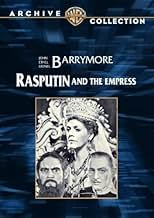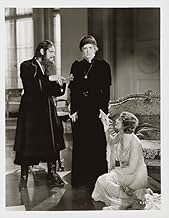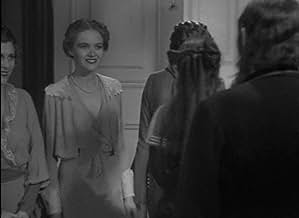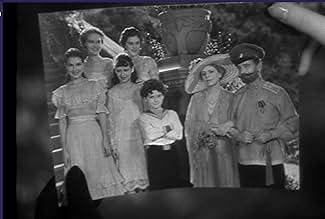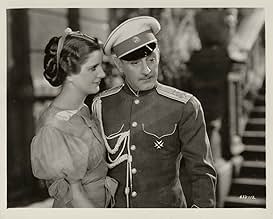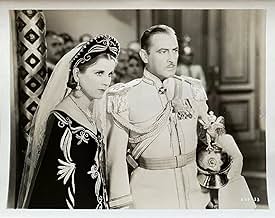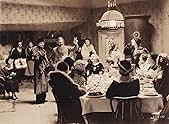AVALIAÇÃO DA IMDb
6,5/10
1,3 mil
SUA AVALIAÇÃO
Um príncipe conspira para matar o Rasputin louco por causa do czar, da czarina e da Rússia.Um príncipe conspira para matar o Rasputin louco por causa do czar, da czarina e da Rússia.Um príncipe conspira para matar o Rasputin louco por causa do czar, da czarina e da Rússia.
- Direção
- Roteiristas
- Artistas
- Indicado a 1 Oscar
- 4 vitórias e 1 indicação no total
Luis Alberni
- Photographer's Assistant
- (não creditado)
Mary Alden
- Natasha's Lady in Waiting
- (não creditado)
Robert Anderson
- Undetermined Secondary Role
- (não creditado)
Oscar Apfel
- Undetermined Secondary Role
- (não creditado)
Henry Armetta
- Photographer
- (não creditado)
Hooper Atchley
- Rasputin's Henchman
- (não creditado)
Mischa Auer
- Butler Pouring Drinks at Party
- (não creditado)
Reginald Barlow
- General Who Underestimated the Japanese
- (não creditado)
Barbara Barondess
- Woman Getting Cigarette
- (não creditado)
Max Barwyn
- Bald Man Trying to See Duna
- (não creditado)
Avaliações em destaque
...forget about it. This film is completely inaccurate in its portrayal of actual events in Russian history. As for the nature and character of the historical figures involved, the three Barrymores give good renditions. There is Ethel Barrymore looking every inch the empress and giving a convincing portrayal of a woman concerned for the welfare of her very ill son - and I would expect that. What I didn't expect is how weird it would be to watch a film in which John Barrymore is the shining hero and Lionel Barrymore is a truly diabolical villain, and each are spectacularly convincing in their portrayals. Lionel is really the center of attention here as he plays the evil Rasputin whose ability to sidestep assassination attempts is legendary, and here a few logical explanations are given to some of his alleged abilities. However, none can explain what happened at the end of his life - how he was poisoned, bludgeoned, shot, and finally thrown into an icy river and still managed to cling to life for awhile.
Although Tsar Nicholas is accurately portrayed as a rather weak willed man and the Romanov marriage is also accurately portrayed as one of the few royal arranged marriages that also turned out to be a love match, there is a mischaracterization of the Tsar as being progressive and wanting a Duma only to have Rasputin defeat that plan. In fact, Nicholas was autocratic in his outlook and distrusted any attempt to give the people more say in their government. This sets up one of the great ironic struggles in the film - that of aristocrat Prince Paul Chegodieff (John Barrymore) wanting more for the peasants in the way of both bread and democracy, and that of peasant mystic Rasputin (Lionel Barrymore) saying that it was God's will that the peasants were poor and powerless. Paul wants to save Russia, Rasputin wants to rule it.
Another piece of fiction shown in the movie for dramatic measure are the public proclamations about the illness of Tsaravich Alexai, the heir to the Russian throne. In fact one of the things that turned the Russian people against the royal family - besides the fact that they were starving during WWI - was that the people assumed that Rasputin's hold over the empress was because they were lovers. The Romanovs did not want it to be known that the only son in the family and heir to the throne had a serious disease - in this case hemophilia - that kept him in very delicate health and would likely lead to a greatly shortened lifespan. They felt it would leave them vulnerable to the overthrowing of their rule. Ironically hiding the truth and leaving Rasputin's relationship to the empress unexplained also led to exactly that.
Watch this one for the high production values and compelling performances by the members of Hollywood's royal family during its golden age, but as for a Russian history lesson, look elsewhere.
Although Tsar Nicholas is accurately portrayed as a rather weak willed man and the Romanov marriage is also accurately portrayed as one of the few royal arranged marriages that also turned out to be a love match, there is a mischaracterization of the Tsar as being progressive and wanting a Duma only to have Rasputin defeat that plan. In fact, Nicholas was autocratic in his outlook and distrusted any attempt to give the people more say in their government. This sets up one of the great ironic struggles in the film - that of aristocrat Prince Paul Chegodieff (John Barrymore) wanting more for the peasants in the way of both bread and democracy, and that of peasant mystic Rasputin (Lionel Barrymore) saying that it was God's will that the peasants were poor and powerless. Paul wants to save Russia, Rasputin wants to rule it.
Another piece of fiction shown in the movie for dramatic measure are the public proclamations about the illness of Tsaravich Alexai, the heir to the Russian throne. In fact one of the things that turned the Russian people against the royal family - besides the fact that they were starving during WWI - was that the people assumed that Rasputin's hold over the empress was because they were lovers. The Romanovs did not want it to be known that the only son in the family and heir to the throne had a serious disease - in this case hemophilia - that kept him in very delicate health and would likely lead to a greatly shortened lifespan. They felt it would leave them vulnerable to the overthrowing of their rule. Ironically hiding the truth and leaving Rasputin's relationship to the empress unexplained also led to exactly that.
Watch this one for the high production values and compelling performances by the members of Hollywood's royal family during its golden age, but as for a Russian history lesson, look elsewhere.
"Rasputin and the Empress" has the distinction of being the only movie that features siblings John, Ethel and Lionel Barrymore. However, of the three, Lionel is DEFINITELY the star and he's given ample opportunity to act and overact...and it's all very enjoyable to watch. His version of Rasputin certainly is NOT subtle.
Now there is a problem with making a film about Rasputin and that is there is a lot of lore involved. Many of the supposed 'facts' are obvious exaggerations....with the man having weird mystical powers and his death is clearly NOT realistically portrayed in history books. Fortunately, MGM chooses to make Rasputin evil but 100% human and without laser shooting out of his eyes!
The story begins in 1905, which is problematic since the film ends in mid-1918 with the murder of the Czar and his family. I say problematic because the children in the story never age! Additionally, although Rasputin had a personal relationship with the Czar and his family for about a decade, here in the film is looks like only a few months or perhaps a year. The fact is that the story wasn't intended as a history lesson and MGM made a few artistic changes here and there...something which probably made the film more enjoyable for most audience members.
As far as portraying this evil monk goes, Lionel Barrymore imbued him an amazing over-the-top personality and humanized him. Humanized because the tricks he does in the film are simply tricks--such as hypnotism and spying on folks in order to 'magically' know their secrets. It's all very enjoyable to watch and never is dull.
As for John, he has a relatively meaty role but is far, far more subdued. You do see him emote strongly during the murder sequence (one that varies tremendously with most accepted versions)....but otherwise he plays his role very straight.
Ethel, on the other hand, has a rather normal and even somewhat bland role in the movie. Simply put, any decent actress could have done her part.
So is it any good? Exceedingly so, yes. The story is never dull, is very big and exciting. And, even though they use a lot of stock footage, its inclusion isn't at all a detriment to the movie. Well worth seeing and quite enjoyable.
Now there is a problem with making a film about Rasputin and that is there is a lot of lore involved. Many of the supposed 'facts' are obvious exaggerations....with the man having weird mystical powers and his death is clearly NOT realistically portrayed in history books. Fortunately, MGM chooses to make Rasputin evil but 100% human and without laser shooting out of his eyes!
The story begins in 1905, which is problematic since the film ends in mid-1918 with the murder of the Czar and his family. I say problematic because the children in the story never age! Additionally, although Rasputin had a personal relationship with the Czar and his family for about a decade, here in the film is looks like only a few months or perhaps a year. The fact is that the story wasn't intended as a history lesson and MGM made a few artistic changes here and there...something which probably made the film more enjoyable for most audience members.
As far as portraying this evil monk goes, Lionel Barrymore imbued him an amazing over-the-top personality and humanized him. Humanized because the tricks he does in the film are simply tricks--such as hypnotism and spying on folks in order to 'magically' know their secrets. It's all very enjoyable to watch and never is dull.
As for John, he has a relatively meaty role but is far, far more subdued. You do see him emote strongly during the murder sequence (one that varies tremendously with most accepted versions)....but otherwise he plays his role very straight.
Ethel, on the other hand, has a rather normal and even somewhat bland role in the movie. Simply put, any decent actress could have done her part.
So is it any good? Exceedingly so, yes. The story is never dull, is very big and exciting. And, even though they use a lot of stock footage, its inclusion isn't at all a detriment to the movie. Well worth seeing and quite enjoyable.
Rasputin and the Empress shouldn't be used as a lesson of pre-Soviet Russia. Names have been changed (and that didn't prevent MGM from law suits) and a lot of the information we now know about this period of Russian history - was not known in 1932.
As other people have commented about this being the only film that Ethel, John, and Lionel Barrymore appeared together, this movie doesn't show why the Barrymores have the reputation that they have. John Barrymore's career started going downhill after the introduction of sound. Lionel Barrymore, wearing one of the phoniest fake beards, tries to capture the charisma and sense of control that Rasputin had over Czarina Alexandra and the Czarevitch. Ethel Barrymore gives an understated performance - too understated at times. When her only son seems to be close to possible death, she doesn't seem all that bothered.
C. Henry Gordon is a great Grand Duke Igor, Ralph Morgan is a convincing Czar Nicholas II, but they don't appear that frequently. Don't expect anyone to speak with a Russian accent or even attempting and accent.
Rasputin is one of the most interesting people in the world during the early 20th Century. He was also one of the most enigmatic and contradictory. A holy man who was accused of raping a nun, excessive drinking, and being power hungry. Barrymore's portrayal of Rasputin plays this up, plus making claims that he will be Russia. He seems almost like Charles Manson at times in the way he can make someone, especially the Czarevitch, behave like they are totally different people compared to the way they acted before meeting Rasputin.
It is best to watch this movie as just that - a fictional representation of various accounts of what happened in the royal court of Russia in its final days. The writers included Charles MacArthur, Ben Hecht, Robert Sherwood, Mercedes de Acosta, and Lenore Coffee - some of the best writers of the period.
It's worth a view - don't expect historical accuracy, but it is an interesting film that tries to show a much different world than what Americans would have known.
As other people have commented about this being the only film that Ethel, John, and Lionel Barrymore appeared together, this movie doesn't show why the Barrymores have the reputation that they have. John Barrymore's career started going downhill after the introduction of sound. Lionel Barrymore, wearing one of the phoniest fake beards, tries to capture the charisma and sense of control that Rasputin had over Czarina Alexandra and the Czarevitch. Ethel Barrymore gives an understated performance - too understated at times. When her only son seems to be close to possible death, she doesn't seem all that bothered.
C. Henry Gordon is a great Grand Duke Igor, Ralph Morgan is a convincing Czar Nicholas II, but they don't appear that frequently. Don't expect anyone to speak with a Russian accent or even attempting and accent.
Rasputin is one of the most interesting people in the world during the early 20th Century. He was also one of the most enigmatic and contradictory. A holy man who was accused of raping a nun, excessive drinking, and being power hungry. Barrymore's portrayal of Rasputin plays this up, plus making claims that he will be Russia. He seems almost like Charles Manson at times in the way he can make someone, especially the Czarevitch, behave like they are totally different people compared to the way they acted before meeting Rasputin.
It is best to watch this movie as just that - a fictional representation of various accounts of what happened in the royal court of Russia in its final days. The writers included Charles MacArthur, Ben Hecht, Robert Sherwood, Mercedes de Acosta, and Lenore Coffee - some of the best writers of the period.
It's worth a view - don't expect historical accuracy, but it is an interesting film that tries to show a much different world than what Americans would have known.
A prince plots to kill the "mad monk" Rasputin for the good of the czar, the czarina and Russia.
In something of a minor epic, this film tells of the rise and fall of Rasputin, the "mad monk". How much is true and how much is legend is open to debate, but all the classic parts of the story are told here. If you are vaguely familiar with the story of Rasputin, this film should feel like you've seen it before (in a good way).
Everything about the film is quite good, from the acting to the costumes and beyond. This is, of course, a showcase for the Barrymore family, and it really does show how much they each contributed to the acting greatness of American cinema.
In something of a minor epic, this film tells of the rise and fall of Rasputin, the "mad monk". How much is true and how much is legend is open to debate, but all the classic parts of the story are told here. If you are vaguely familiar with the story of Rasputin, this film should feel like you've seen it before (in a good way).
Everything about the film is quite good, from the acting to the costumes and beyond. This is, of course, a showcase for the Barrymore family, and it really does show how much they each contributed to the acting greatness of American cinema.
By now, everyone - but everyone - has commented on what bad history this movie is. Fine, I won't argue the point. But, what about it as drama? In my opinion, this is one of the most powerful tales of tragedy of it's time. ( This is particularly noteworthy given MGM's later penchant for frivolousness. ) Part of it has do do with the sincerity and conviction of the story. [ Alhough Charles MacArtur and others are given credit for the screenplay, I believe the original story - I have read a copy of the book - was written by a Russian émigré who fled the revolution. Unfortunately, I am presently unable to locate my copy. ] Nonetheless, this would go a long way towards explaining the movie's passion.
As for the acting; it features an outstanding cast, including the three Barrymores, as well as an assemblage of first rate supporting actors of the time. ( Anyone notice Edwarld Arnold as Dr. Remezov? ) Of course, much of it seems dated by today's standards. ( This was 1932, after all. ) Keep in mind that this is high melodrama. In that context, Lionel Barrymore exudes pure evil as the scheming, mad monk. He also brings out the crudity and vulgarity of the man, which generally jibes with historical accounts. Just try not to dwell on the fake beard.
John is fine and properly earnest as Prince Chegodieff, although his performance does seem a bit old-fashioned next to Lionel's. He really lets it all hang out in the murder scene, however. Ethel seems a trifle stiff, but Ralph Morgan is just right as Nicholas. In fact, sincerity and seriousness of purpose seem to be the hallmarks of the entire ensemble. And through it all, there is this sense of tragic inevitability; of events that, once set in motion, cannot be reversed.
One other thing that warrants a mention is the music. The Russian Orthodox liturgical music used in the celebratory scene near the beginning is moving and powerful. It could well put one in mind of the the wedding scene in Michael Cimino's "The Deer Hunter" ( 1978 ). Later, there is a medley of martial music, accompanied by historical footage, as Russia mobilizes for The Great War. Here we hear "God Save the Tsar", a tune which Mikhail Glinka featured in his opera, "A Life for the Tsar", but which was routinely banned during Soviet performances. All in all, exciting stuff.
This is a movie well worth watching, historical accuracy notwithstanding.
As for the acting; it features an outstanding cast, including the three Barrymores, as well as an assemblage of first rate supporting actors of the time. ( Anyone notice Edwarld Arnold as Dr. Remezov? ) Of course, much of it seems dated by today's standards. ( This was 1932, after all. ) Keep in mind that this is high melodrama. In that context, Lionel Barrymore exudes pure evil as the scheming, mad monk. He also brings out the crudity and vulgarity of the man, which generally jibes with historical accounts. Just try not to dwell on the fake beard.
John is fine and properly earnest as Prince Chegodieff, although his performance does seem a bit old-fashioned next to Lionel's. He really lets it all hang out in the murder scene, however. Ethel seems a trifle stiff, but Ralph Morgan is just right as Nicholas. In fact, sincerity and seriousness of purpose seem to be the hallmarks of the entire ensemble. And through it all, there is this sense of tragic inevitability; of events that, once set in motion, cannot be reversed.
One other thing that warrants a mention is the music. The Russian Orthodox liturgical music used in the celebratory scene near the beginning is moving and powerful. It could well put one in mind of the the wedding scene in Michael Cimino's "The Deer Hunter" ( 1978 ). Later, there is a medley of martial music, accompanied by historical footage, as Russia mobilizes for The Great War. Here we hear "God Save the Tsar", a tune which Mikhail Glinka featured in his opera, "A Life for the Tsar", but which was routinely banned during Soviet performances. All in all, exciting stuff.
This is a movie well worth watching, historical accuracy notwithstanding.
Você sabia?
- CuriosidadesAnnoyed that his brother John Barrymore was trying to show him up by placing his hand on him while he was finishing a scene (an ancient actor's technique for drawing attention to oneself), Lionel Barrymore excused himself from the set and went to the back lot to find a telephone. He then phoned the set and told director Richard Boleslawski that "he'd better advise Mr. John Barrymore to not place his hand on me at the close of this scene, lest I lay one on him!" By the time Lionel returned to the set, John has been advised to keep his hands to himself.
- Erros de gravaçãoThe fact that the Tsarevich was sick was not announced publicly as portrayed in the movie. It was kept a secret.
- Citações
Natasha: You don't like him because he's so outspoken. You don't like his manners. Isn't that it?
Prince Chegodieff: No, that's not it. It, its his, smile. It's like a man-eating shark with a bible under his fin.
- Versões alternativasUpon its premiere "Rasputin and the Empress" ran approximately 132 minutes. Due to the famous lawsuits against it, a number of scenes had to be cut for legal reasons. One critical scene that was deleted was one which implied that Rasputin had raped Diana Wynyard's character of "Princess Natascha". The removal of this scene tended to make the character of Princess Natascha somewhat incomprehensible - initially she is a supporter of Rasputin; in the latter part of the film she is very afraid of him. Unless the viewer is aware of the cuts made in the film, there does not appear to be any explanation for the change in Princess Natascha toward Rasputin.
- ConexõesFeatured in Biografias: The Barrymores (2002)
- Trilhas sonorasRussian National Anthem
(uncredited)
[Played during the opening credits and at the end]
Principais escolhas
Faça login para avaliar e ver a lista de recomendações personalizadas
- How long is Rasputin and the Empress?Fornecido pela Alexa
Detalhes
- Data de lançamento
- País de origem
- Idiomas
- Também conhecido como
- Rasputin and the Empress
- Locações de filme
- São Petersburgo, Rússia(archive footage)
- Empresa de produção
- Consulte mais créditos da empresa na IMDbPro
Bilheteria
- Orçamento
- US$ 1.022.000 (estimativa)
- Tempo de duração2 horas 1 minuto
- Cor
- Proporção
- 1.37 : 1
Contribua para esta página
Sugerir uma alteração ou adicionar conteúdo ausente

Principal brecha
By what name was Rasputin e a Imperatriz (1932) officially released in India in English?
Responda
